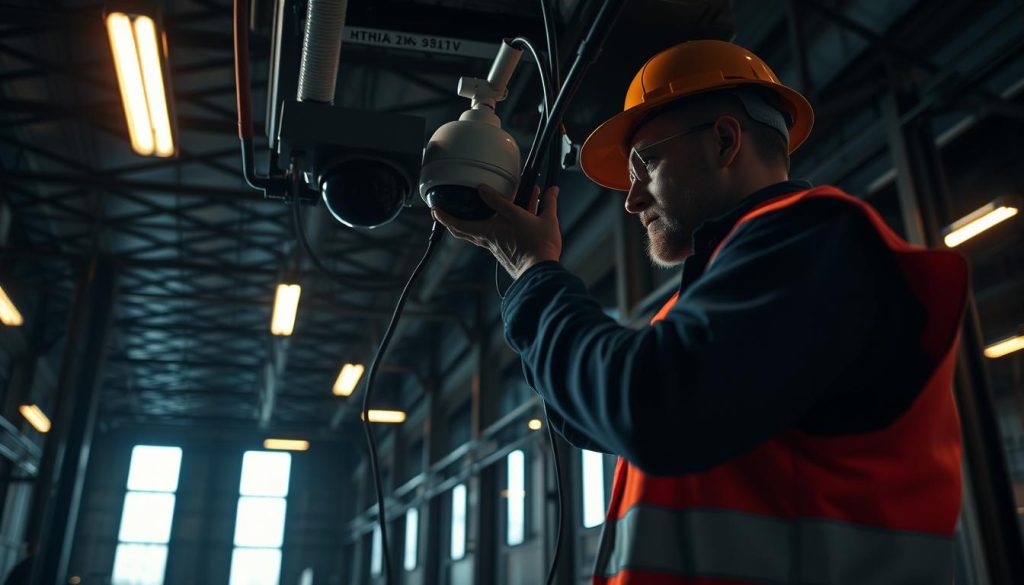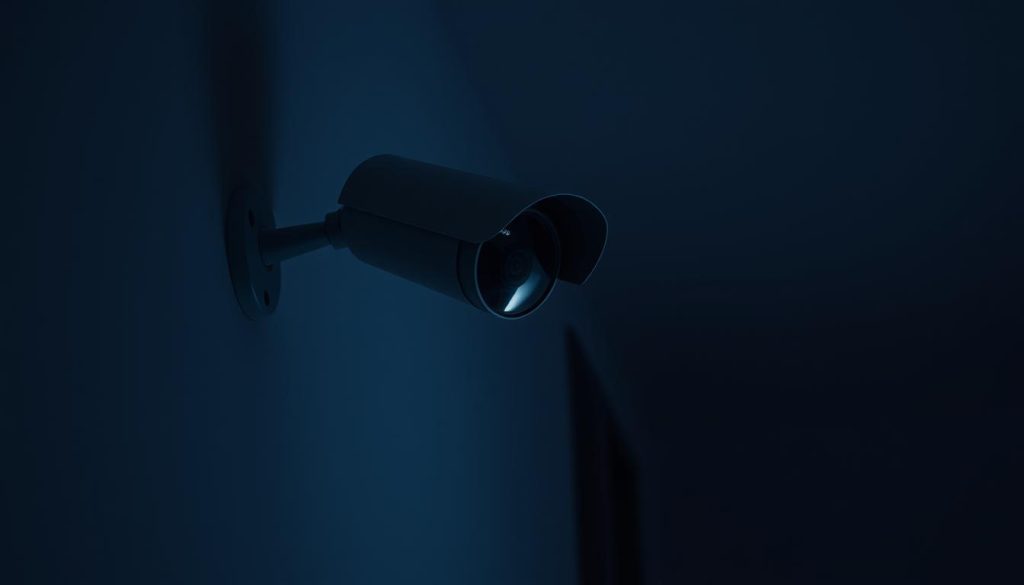In today’s world, security is a top priority. Many people wonder if they can set up CCTV without WiFi, which is common in busy cities like Singapore. It’s important to know if you can get good surveillance without the internet.
Fortunately, there are ways to have reliable surveillance without WiFi. This means you can feel safe and secure in your home or business.
Key Takeaways
- CCTV installation can be accomplished without a WiFi connection.
- Security cameras without WiFi are available for effective surveillance.
- Various technologies support CCTV systems in urban environments.
- Understanding alternatives can enhance your security strategy.
- Real-time surveillance options exist even without internet access.
Understanding CCTV Systems and WiFi Connectivity
CCTV systems have changed how we watch over cities like Singapore. They let us see what’s happening and react fast to dangers. WiFi makes these systems better by letting us check in from anywhere.
Today’s CCTV cameras use WiFi to send video online easily. This means we can watch live feeds from anywhere. But, not all systems need WiFi. Some work without it, for those who want something reliable offline.
As tech keeps getting better, finding good security is key. Knowing how CCTV and WiFi work together helps us choose the right setup for our needs.
Can I install CCTV without WiFi?
Understanding CCTV systems helps us see how they work and the challenges of installing them without WiFi. The CCTV definition is about closed-circuit television, used for watching and securing areas. These systems record video, helping to keep places safe.
Definition of CCTV and Its Functionality
CCTV systems are key for constant watching. They help prevent crime, record evidence, and let owners watch their property. The surveillance functionality includes video recording, motion detection, night vision, and alerts for odd activities.
Importance of WiFi in Traditional CCTV Systems
Many CCTV systems use WiFi in CCTV for live access to footage on phones or computers. This lets users watch their property from anywhere, making the system better. But, systems that record directly can work well without WiFi.
Alternative Options for CCTV Installation without WiFi
Looking for CCTV options without WiFi? Digital Video Recorders (DVRs) and Network Video Recorders (NVRs) are great choices. They work without the internet, keeping your surveillance safe and uninterrupted.
Using Digital Video Recorders (DVR)
Digital Video Recorders are easy to use for CCTV footage. They record video on hard drives or other storage. This is perfect for places without network access.
DVRs make it simple to manage and watch recorded video. They work offline, adding security and reducing online risks.
Exploring Network Video Recorders (NVR)
Network Video Recorders are another top pick for CCTV without WiFi. They can use a network or work on their own, recording and watching continuously. This setup keeps your surveillance strong and independent of the internet.
Want to learn more about CCTV systems? Check out this guide on connecting CCTV without WiFi. Both DVRs and NVRs are solid choices for boosting security without WiFi.
Types of Security Cameras that Operate Independently of WiFi
In today’s world, many people look for ways to keep their homes safe without needing WiFi. There are several types of cameras that can do this. Cellular cameras and battery-powered ones are great because they don’t need a wireless network.
Cellular Security Cameras: Arlo Go and Reolink Go
Cellular cameras like the Arlo Go and Reolink Go are perfect for places without WiFi. They use cell networks to send video, so you can always watch what’s happening. The Arlo Go is known for being easy to set up and works well anywhere.
The Reolink Go has a long battery life and records in high definition. This makes it great for keeping an eye on things.
Battery-Powered Security Cameras and Their Advantages
Battery-powered cameras have their own perks. They can be set up anywhere, without needing to find a power outlet. This is perfect for watching over remote spots, like construction sites.
These cameras are also easy to put up and take care of. This makes them a favorite for those who want security without hassle.
Benefits of Installing CCTV without WiFi
Installing a CCTV system without WiFi has many benefits. It boosts security and protects data. The CCTV benefits of using cellular connections are clear. They add strong security measures to protect your property from threats.
Enhanced Security with Cellular Connections
Cellular CCTV systems send data through mobile networks. This creates a strong link to security services. It’s a big plus in hacking prevention because cellular networks are harder to get into than WiFi.
These systems keep working even when there’s no power or WiFi. This means you can always watch what’s happening. Using cellular tech gives you peace of mind and top-notch video quality for better security.
Reduced Risk of Hacking
Cybersecurity is a big deal for surveillance systems. With cyber threats getting smarter, choosing not to use WiFi is wise. Cellular cameras are harder to hack than WiFi ones.
This makes your footage safer and strengthens your surveillance setup. It means more enhanced security for your home or business.
Challenges of Using CCTV Systems without WiFi
Using CCTV systems without WiFi can be tricky. It’s important to understand the issues with cellular data. This knowledge helps in making the right choices.
Cost Implications of Cellular Data Plans
The challenges of CCTV include high cellular data costs. Monthly plans can be pricey, depending on data usage. High-resolution video streams can quickly increase costs.
This can be a big financial problem for many. Other surveillance options might be cheaper and just as good.
Limitations in Real-Time Monitoring and Remote Access
Non-WiFi systems also have monitoring limitations. They can meet basic surveillance needs but lack real-time monitoring and remote access. Alerts and notifications might not work as well as on WiFi systems.
This can lead to security gaps. It’s important to consider these issues before choosing a system.
How to Set Up a CCTV System Without WiFi
Setting up a CCTV system without WiFi is easy with the right steps. This guide will help you set up your DVR system. It covers all the details for the best local storage.
Step-by-Step Guide for Installing DVR systems
To start installing your DVR system, follow these steps:
- Select the Right Equipment: Pick a DVR that meets your storage and camera needs.
- Plan Camera Placement: Find the best spots for your cameras to cover important areas.
- Run Cables: Use good quality cables to link cameras to the DVR.
- Connect the DVR: Connect the DVR to a monitor for easy viewing.
- Power Supply: Make sure all devices have a steady power source.
Configuration Tips for Local Storage Systems
Configuring your system right is key for local storage. This way, you can easily get your footage. Here are some tips:
- Format the Hard Drive: Make sure the hard drive in your DVR is set up right for the best performance.
- Adjust Recording Settings: Change the resolution and frame rate to fit your needs and save space.
- Schedule Recordings: Use features like motion detection and time-lapse to save space and work better.
- Regular Maintenance: Check your storage and settings often to keep your system running well.
Comparing WiFi and Non-WiFi CCTV Systems
When looking at CCTV systems, knowing the difference between WiFi and non-WiFi is key. Each type has its own set of benefits and drawbacks. This affects how well they work, how secure they are, and how easy they are to use. We’ll dive into the good and bad of WiFi CCTV systems and non-WiFi systems to help you make a smart choice.
Pros and Cons of WiFi CCTV Systems
WiFi CCTV systems are super flexible and easy to get into. You can watch your place from anywhere using apps or web sites. This makes it easier to keep an eye on things in real time.
- Pros:
- They’re easy to set up without a lot of wiring.
- You can watch them from anywhere with your phone.
- They work well with smart home systems for extra convenience.
- Cons:
- They can be hacked because they use the internet.
- The WiFi signal can be weak, causing problems.
- You need a steady internet connection to work.
Pros and Cons of Non-WiFi CCTV Systems
Non-WiFi CCTV systems are known for their strong security and not needing the internet. They use cables like coaxial or Ethernet, which makes them stable and reliable.
- Pros:
- They’re safer from hackers because they don’t use the internet.
- They work well and capture good footage.
- They keep working even when the internet is down.
- Cons:
- Setting them up can be harder because of the wiring.
- You can’t watch them from as far away as WiFi systems.
- They cost more to set up at first.
Long-Term Maintenance of CCTV Systems Without WiFi
Keeping a CCTV system running without WiFi is key to its success. It involves storing recorded footage properly and checking equipment regularly. This ensures your security setup stays strong over time.
Storage Solutions for Recorded Footage
Storing your surveillance footage well is vital. You have several options:
- SD cards: Great for small systems, they’re easy to use and portable.
- DVR systems: They hold more footage, letting you save recordings for days.
- External hard drives: Best for storing lots of footage, adding to your backup.
The right choice depends on how much footage you have and how long you need to keep it.
Periodic Equipment Checks for Optimal Performance
Regular checks on your equipment are essential. Here’s what to do:
- Check camera lenses for dirt or blockages.
- Make sure recording devices work as they should.
- Look at stored footage to see if it’s clear and complete.
Regular upkeep keeps your system running well and catches problems early.

Conclusion on CCTV Installation Choices in Singapore
In Singapore’s bustling city, picking the right CCTV system is key to keeping properties safe. There are many choices, and users need to think about what they really need. They should look at the features, cost, and how easy it is to install.
There are both old and new CCTV systems to choose from. Users might want to look at non-WiFi options like DVRs and NVRs. These can add a lot to your safety and give you peace of mind. Making a smart choice means thinking about your security needs and what technology is out there.
Additional Resources for CCTV Installation and Security Tips
Installing and maintaining CCTV systems can be complex. Luckily, there are many resources available to help. These include detailed guides and articles on camera types, technology, and installation. Using these resources can help you make smart choices and ensure your system works well.
Video tutorials are great for those who learn better by seeing. They show how to set up different systems and offer tips for fixing problems. This way, you can handle your security projects with confidence.
Also, joining community forums and reading expert blogs can be very helpful. You can ask questions, share your experiences, and learn about new security technologies. With these resources, you can better understand CCTV systems and improve your safety in Singapore.

